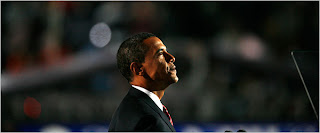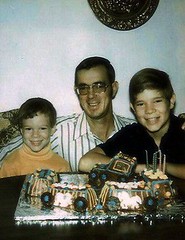Okay, so let's talk about
People First Language.
I've seen it presented as a sort of universal truth, as if the rightness of People First Language is a given, with little room for argument. People First Language
must be used, I read time and time again, like a moral imperative. The heartfelt and dedicated advocates of People First Language want very much for it to be accepted as a standard practice. Indeed, they often insist on it. But it's not universally accepted, although people who find it troubling are often nervous about discussing why. I'm a little nervous about writing this, to tell the truth, and we all know what an ass I can be.
The idea behind People First Language is simple, and inherent in the name of the concept. It puts the person first, allowing their basic existence to define them before their disability. People First Language describes what the person has, but not who that person is. By these rules, I am not a diabetic. I am a guy who has diabetes. The thinking behind People First Language says that identifying a person by their diagnosis can generate fear and pity, and works against the goal of inclusion. People First Language grants a person dignity, the thinking goes, by blunting the impact of their diagnosis on that person's self-image, and also in how they are perceived by the world.
"It's not 'political correctness,'" writes People First Language advocate Kathie Snow, "but good manners and respect."
Perhaps. I do see the point, and insofar as I think these kinds of perceptions are important issues, I can see some of the benefits of People First Language. I don't want Schuyler to be hurt by the world around her, and I certainly don't want her disability to make her feel like there's something wrong with her.
But here's the thing. As hard as it may be to admit this, there
is something wrong with her. And admitting that she's broken on some level is difficult, and it feels harsh. But it's a harshness that comes from somewhere else, from whatever power you think hands out that kind of Very Special Gift. God if you believe in him, Fate if you don't, or just random shitty luck if that's how you roll. And the thing that it's easy to miss, because the idea breaks my heart too, is that no one is more aware of Schuyler's disability than Schuyler herself. When you think about it, that seems obvious, but for those of us who love her and care about her, it might be much easier to accept if we could adopt language that takes some of the sting out of her reality.
People First Language attempts to soften the language that we use to describe disability, and I understand why that's tempting. But in doing so, it doesn't blunt the monsters, not even a little. If you say, as People First Language instructs, that a paraplegic is NOT confined to a wheelchair or is NOT wheelchair-bound, but instead refer to them as "an individual who uses a wheelchair", you have taken away that wheelchair's power over that person
in perception only. It even implies choice, at least in my opinion. I use things, and I use parts of myself, with intent. I don't think I'd say I
use my heart, or my kidneys, because I am not given a choice, but I do use my legs. I choose to use them, and I can choose not to.
That sounds like I'm being obvious and glib, but it bothers me, and for some very real reasons. Because when you take away responsibility from the monster, who are you going to give it to? When you say that a person
uses a wheelchair, you are setting up ownership of that disability. The monster doesn't have you. You have the monster.
But do we really want to hand ownership of that disability to a child who is struggling to understand their place in the world? Does handing responsibility for a disability over to the child give them an unreasonable sense of their own role in the possession of that disability? If you're using a wheelchair, then why not just stop? If that sounds silly to you, ask a now-grown child of divorced parents if they still, even if only in their secret hearts, take some measure of responsibility for their parents' breakup. Ask an adult with a disability if they ever wondered as kids what they did to deserve their situation. Ask them if they ever wonder that now.
If Schuyler isn't "non-verbal" but instead "communicates with an assistive technology device", then why? Why would she do that? If Schuyler doesn't feel like she is in the clutches of a monster to whom she brings the fight every day, that's great and my biggest dream made real. But if she then comes to the conclusion that she owns that lack of speech, then what can be the reason for its persistence? Is she not trying hard enough? Why isn't she fixing the issue herself? If she's not broken, then what's the problem? Lack of motivation? Is she simply not good enough? Not strong enough, or smart enough, or brave enough?
Schuyler as the victim (another word forbidden by People First Language) of Fate and its monster minion, as sad as that may sound, is infinitely preferable to Schuyler as the product of her own subtly-implied failure. I simply won't have it, any more than I'll have the idea of "acceptance" stand in the way of her hard work, and of ours. To my thinking, People First Language sets up an unreasonable expectation, taking the responsibility away from unfair forces at work in the world and instead laying it squarely at the feet of the very last people in the world who deserve to wonder if they somehow had this coming.
And don't even get me started on the ridiculous and unwieldy term "nondisabled" to describe neurotypical or "normal" people. That should offend anyone who loves the English language.
Listen. I get why people use People First Language. I understand the push to bring sensitivity to an often cold world. That's something I fight for as much as anyone else, after all. I wrote an entire goddamn book about it. But please try to
understand, people. Don't just try to make it feel better. Don't blur the lens, don't make pretty words do the duty once performed by ugly ones.
"Retard" is an offensive term, I think we can all agree. But in its own way, I find "differently abled" or even "special" to be far worse, because they minimize the struggle. They allow the rest of us to sigh and wipe away a tear while we watch some very touching report on the
Today Show, and then say "Wow, thank you Meredith, for showing me the story of that brave little trouper!" And then we go on with our lives, knowing that someone is watching out for that precious little angel. Someone like Jesus, perhaps, or one of his dedicated soldiers on earth.
Or someone like me. Or you. Or no one at all, no one except the person who lives their life
confined to a wheelchair or
suffering from a debilitating condition that makes a nightmare out of the things that you and I take for granted, the everyday tasks and activities that give us our humanity, and can rob us of it when they are taken away.
I helped Schuyler take a preliminary eye test today, in anticipation of an
hour-long appointment later this week for the glasses that she'll apparently be getting soon. I held her device for her while she identified the letters on the wall that she could read. She did a great job, and I was incredibly proud of her. She's making her way in the world, and she'll continue to do so with determination and enthusiasm and even optimism, but she'll also do it with a big dose of "fuck you" when needed. And she's not going to get that from People First Language. Kind words aren't going to open any doors for her, not a one. They might simply make her feel like a failure for being unable to open them herself.
Ultimately, People First Language feels to me like it exists not so much to help broken children like Schuyler, most of whom I suspect are tougher and more pragmatic than the people who love them perhaps realize. I think it works mostly for the people around them, those of us who aren't afflicted and yet lead lives forever changed by disability.
People First Language probably makes that life a little easier for the rest of us to bear, but honestly, I'm not sure it
should be easier for us. In that respect, I'm not convinced that People First Language is putting the right people first.



